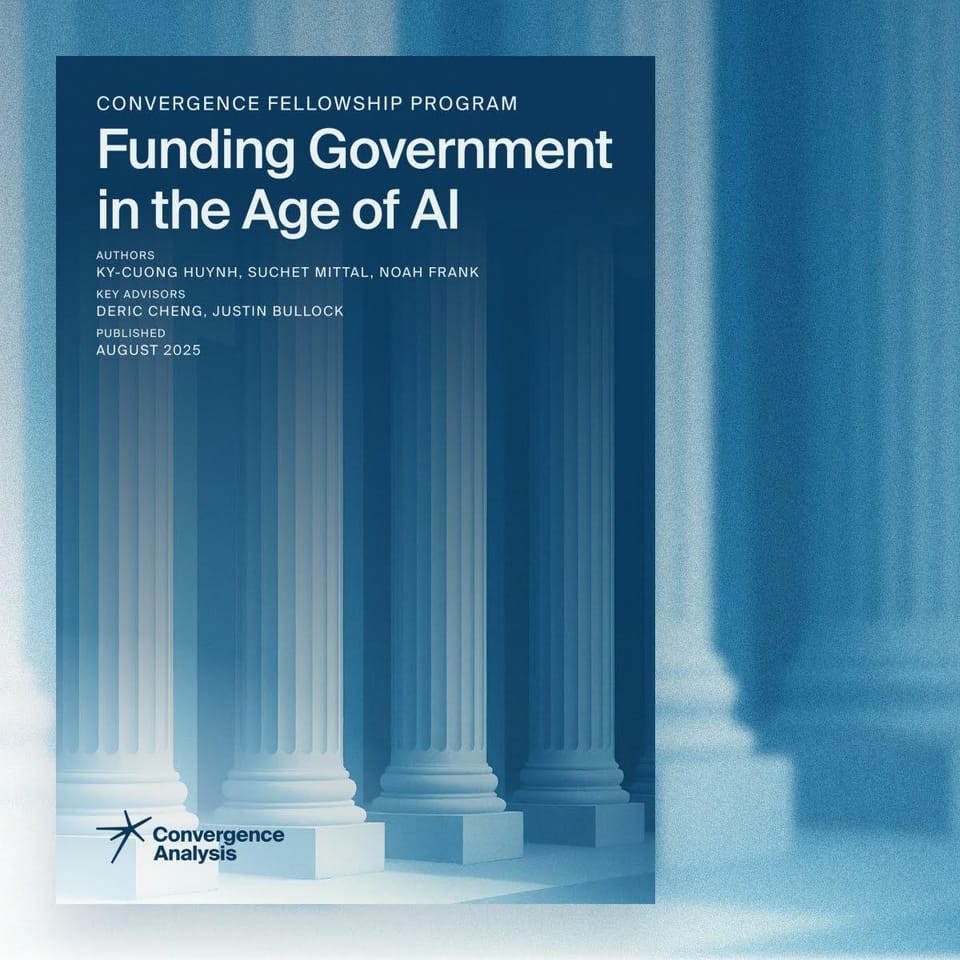Funding Government in the Age of AI

Summary
I'm happy to announce the release of "Funding Government in the Age of AI", a research paper from the project I proposed and led over the past several months. The work was conducted at Convergence Analysis, an AI governance think tank, through the Supervised Program for Alignment Research (SPAR). I worked with research fellows Suchet Mittal and Noah Frank, with guidance from our advisors Deric Cheng and Justin Bullock.
In short, we assessed the best ways to ensure governments remain funded when AI transforms the economy. This is the revenue side of fiscal policy[1] , and to our knowledge, we are the first team in the world to examine it for transformative artificial intelligence (TAI)[2].
Insights
The Convergence website has the report's Abstract and Executive Summary, so I'll focus here on high-level insights that I personally found surprising:
-
Mass automation is the expectation (in some cases the explicit goal) of frontier AI firms. This would create mass unemployment and spike demand for social safety nets. Simultaneously, governments would find themselves short of funds. Why? Taxes on labor income constitute the majority of government revenue today: 50.4% on average across the OECD (Bunn 2022), and 84% in the US (Tax Policy Center 2024).
-
AI-generated wealth will likely bypass existing tax systems. For example, corporate income taxes are easily minimized through profit-shifting to tax havens. Capital gains taxes only apply when equity is sold, which many wealthy individuals already circumvent through borrowing against holdings (see the Appendix of our paper). When someone says “Tax AI to fund UBI [universal basic income]”, you should ask: “How exactly will we tax them?” Without new systems for taxation and redistribution, we risk creating a socioeconomic Dystopia with unprecedented inequality.
-
Automation/robot taxes are among the worst possible policies in most scenarios. They're (1) too brittle in their assumptions about what should be taxed and (2) too difficult to implement practically. What counts as a robot? How would you determine if someone was laid off due to automation? See page 33 of our paper for more.
-
Almost no one has performed economic modeling or analysis specific to transformative AI. Economists like Anton Korinek, Donghyun Suh, and Lee Lockwood are rare exceptions. Most economists assume slightly better chatbots in their extrapolations. Meanwhile, many (though not all) technologists expect virtual coworkers at minimum. Truly transformative AI would usher in a new economic era, one that would require us to rewrite the equations that describe the economy. Here is one interactive model worth trying.
-
Current AI paradigms will likely continue scaling through 2030, and advanced humanoid robotics may follow soon after. Alternative paradigms have received less investment given current scaling success, and new paradigms remain possible. We should expect progress to continue by default, not stagnate.
Some complicating factors:
-
Taxation is a global coordination problem. Unilateral moves trigger trade disputes and encourage firms to relocate profits. While the OECD BEPS 2.0 project offers a promising global solution, Trump's withdrawal and unclear political prospects complicate progress.
-
Fundamental uncertainty and disagreement about AI's trajectory, even among experts, makes building consensus difficult. My team identified policies that work across diverse scenarios, and we recommend policymakers be proactive and evidence-seeking rather than reactive.
Resources
For folks who are curious to read more into the political economy of AI:
Changelog
- 2025-09-18: Added an Insights section to highlight surprising findings
References
Bunn, Daniel. 2022. “Sources of Government Revenue in the OECD.” Tax Foundation, February 10. https://taxfoundation.org/data/all/global/oecd-tax-revenue-2022/.
Gruetzemacher, Ross, and Jess Whittlestone. 2022. "The Transformative Potential of Artificial Intelligence." Futures 135 (January): 102884. https://doi.org/10.1016/j.futures.2021.102884.
Hendrycks, Dan. 2025. Introduction to AI Safety, Ethics, and Society. 1st ed. CRC Press. https://doi.org/10.1201/9781003530336.
McKernon, Elliot, and Justin Bullock. 2024. Transformative AI and Scenario Planning for AI X-Risk. Convergence Analysis. https://www.convergenceanalysis.org/publications/transformative-ai-and-scenario-planning-for-ai-x-risk.
Roser, Max. 2022. "Artificial Intelligence Is Transforming Our World — It Is on All of Us to Make Sure That It Goes Well." Our World in Data, December 15. https://ourworldindata.org/ai-impact.
Tax Policy Center. 2024. “What Are the Sources of Revenue for the Federal Government?” January. https://taxpolicycenter.org/briefing-book/what-are-sources-revenue-federal-government.
Fiscal policy is how the government influences the economy via taxes and government spending. In contrast, monetary policy is how a country’s central bank influences the economy via its management of interest rates and the money supply. ↩︎
Transformative artificial intelligence (TAI) refers to systems capable of causing significant, irreversible societal changes comparable to the Agricultural and Industrial Revolutions (Gruetzemacher and Whittlestone 2022; Hendrycks 2025; McKernon and Bullock 2024; Roser 2022) ↩︎